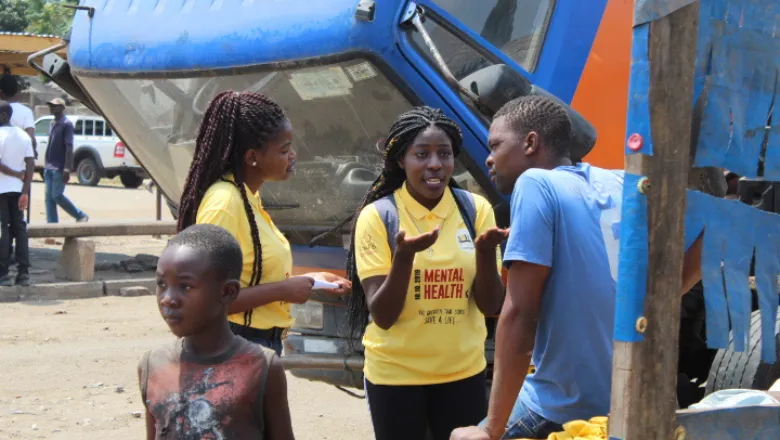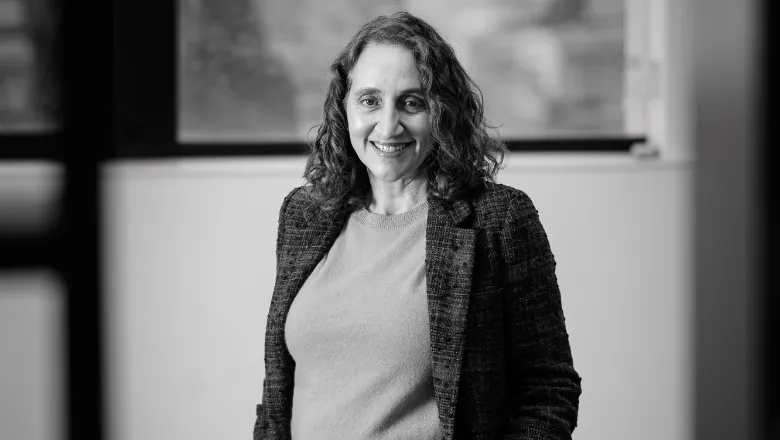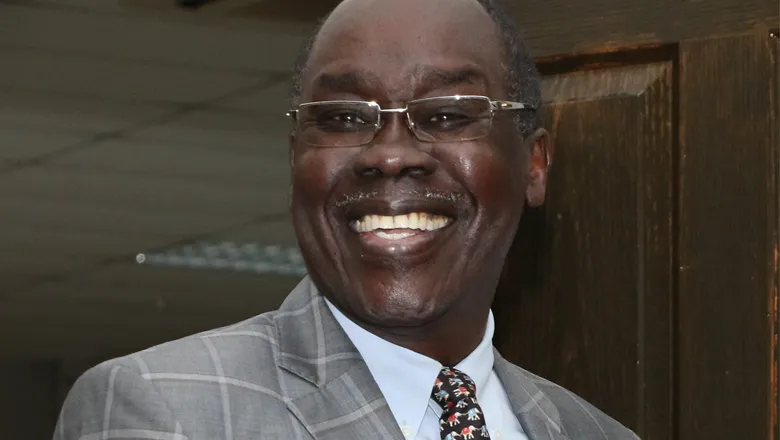
Professor Melanie Amna Abas
Professor of Global Mental Health
- Director, King’s Global Health Institute
Research interests
- Psychiatry
Biography
Melanie Abas is Professor of Global Mental Health at the Institute of Psychiatry, Psychology & Neuroscience at King’s College London and Consultant Psychiatrist, South London and Maudsley NHS Foundation Trust. She was appointed Director of the King’s Global Health Institute in 2023.
Her research focus as a psychiatric epidemiologist is development and clinical trials of therapies for depression in underserved populations which can be delivered through primary health care, and building research capacity in groups under-represented in academia.
She is known for research which built conclusive evidence that a low-cost talking therapy, the ‘Friendship Bench’, originating from Zimbabwe, significantly reduces depression. This African innovation has had global impact, including in the US and UK.
Melanie is also recognised for research with the PROTECT team which underpinned UK policy changes and new NHS training, enabling better health and safeguarding for UK survivors of human trafficking.
At King's, Melanie leads the research group ‘Therapies in Global Mental Health”, and a research team called Connecting HIV and Mental Health (CHARM). Through listening and allying with partners from the global south, these teams have produced regionally relevant research evidence which has changed policy, improving equity to mental and behavioural healthcare.
Melanie’s portfolio of projects includes development and testing of a new intervention called TENDAI (Therapy for Adherence+Depression). TENDAI combines active ingredients to treat depression and improve adherence to medication for people living with HIV, and potentially other chronic conditions, With the founder of the Friendship Bench, Prof Dixon Chibanda, Melanie co-directs African Youth in Mind, adapting the Friendship Bench for youth.
Her work has been characterised by working through equitable partnerships with global south researchers and research capacity building for groups traditionally under-represented in academia. She has worked on African-led capacity building programs since 2010 including the US-African Medical Education Partnership Initiative across 13 African medical schools 2010 – 2019.
Melanie is the King's College London partner for the African Mental Health Research Initiative (2016 – 2022; 2023 - 2027) which is led from the University of Zimbabwe as part of the Science Foundation for Africa 'Developing Excellence in Leadership, Training and Science Initiative', supported by the Wellcome Trust.
Melanie completed her medical training at the University of Birmingham before receiving her MSc in Epidemiology from the London School of Hygiene and Tropical Medicine and her doctorate from the University of Auckland.
Melanie’s early research funded by the MacArthur Foundation was on the social origins of depression in women in Zimbabwe. This was the first to show a common mechanism for the development of depression cross-culturally through the experience of life events involving humiliation and loss.
Research interests
- Cultural adaptation and Clinical Trials of scalable interventions for depression and other common mental disorders deliverable by non-specialists in low-resource settings.
- Research at the interface between mental health and priorities for the global south including women’s health, education, and ending the HIV epidemic.
- Early intervention and remission of depression in low-resource settings
- Behavioural interventions to improve adherence to treatment for long-term conditions, especially HIV.
- Equitable research partnerships between the global north and the global south; decolonisation and research fairness.
- Research capacity-building.
Teaching
Melanie regularly teaches and supervises students on topics related to Global Mental Health including: cross cultural measurement, psychiatric epidemiology, development and adaptation of interventions for depression and anxiety, aspects of depression in low and middle income countries, grant writing, scaling up mental health services, ethics of research in low resource settings, on the following courses:
MSc in Global Mental Health
MSc in Affective Disorders
BSc in Neuroscience
MSc in Mental Health Studies
Expertise and public engagement
Melanie is a member of the Wellcome Trust Populations and Public Health Advisory board, and a faculty member of the UK MRC Applied Global Health Board.
She is scientific advisor to the University of Washington, Behavioral Research Center for HIV and an editor on the International Editorial Board of the British Journal of Psychiatry. She previously sat on the Wellcome Trust/MRC/DFiD Joint Global Health Trials committee, and on the Wellcome Bloomsbury Tropical Health Policy Group.
Melanie has published articles in Newsweek and in the Association of Commonwealth Universities review; her work has featured in The Guardian and Washington Post and on NPR radio, BBC World Service and CNN news.
Further details
Research

Centre for Global Mental Health (CGMH)
The Centre for Global Mental Health (CGMH) aims to address inequities by closing the care gap, and to reduce human rights abuses experienced by people living with mental, neurological and substance use conditions, particularly in low resource settings with a view to contributing to a world where all people living with mental, neurological and substance use disorders can live a life of meaning and dignity.

African Youth in Mind
African Youth in Mind focuses on adapting and testing a stepped care intervention for youth with depression & anxiety in Ghana and Zimbabwe.
Project status: Ongoing

The TENDAI Study
Task shifting to treat depression and HIV medication nonadherence in low resource settings
Project status: Ongoing
News
Over £5m Wellcome funding to digitalise the Friendship Bench
Researchers have been awarded £5.3 million to optimise the digital version of the Friendship Bench mental health intervention for scale in Zimbabwe and beyond.

Over two thirds of people living with HIV in Zimbabwe have experienced or witnessed traumatic events
People living with HIV in Zimbabwe have high exposure to traumatic events, but most do not go on to develop PTSD, according to new research from the Institute...

Friendship Bench 'grandmothers' could help control HIV
Friendship Bench therapy delivered by community ‘grandmothers’ could empower people living with HIV to take their medication, according to new research by...

Providing mental health support in peace efforts helps alleviate PTSD and depression
New study shows group counselling and one -on-one peacebuilding activities improve mental health in Nigeria
New Director of the King's Global Health Institute Announced
Professor Melanie Amna Abas will begin the post on 1 December 2023, leading the Institute’s research on improving healthcare in lower resource settings.

A new generation of Inspiring Women at the IoPPN
28 new portraits of internationally recognised female professors at the Faculty have been added to IoPPN’s ‘Inspiring Women’ exhibition, celebrating the...

Professor Melanie Abas receives £2.75m in UKRI funding
Professor Melanie Abas, with members of a new Global Health Research Group, has received £2.75m in NIHR funding to learn how best to treat depression and...

Integrating mental health into HIV prevention and care: a call to action
Dr Melanie Abas was recently given the opportunity to edit a special supplement if the Journal of the International Society of Aids ahead of the 11th IAS...

Tribute to Professor James Hakim
Tribute to Professor James Hakim, world-leading HIV scientist and research collaborator with King’s College London, who passed away in January 2021 from...

Events

Weaving Lives Together in Nigeria: An Integrated Mental Health, Peacebuilding and Creative Livelihoods Intervention
Join us for a discussion around the collaboration between the psychosocial support and peacebuilding organisations in Nigeria.

Public Lecture: Towards Rigour and Justice in Research for Health
We are honored to host Dr. Seye Abimbola for a public lecture titled "Towards Rigour and Justice in Research for Health."
Please note: this event has passed.

From Zimbabwe to the World: Friendship Bench and the next generation of African mental health research leaders
Join leading experts for an inspiring talk and panel discussion on the Friendship Bench and African Mental Health Research Initiative.
Please note: this event has passed.
Features
From Zimbabwe to the World: the next generation of African mental health research leaders
King’s College London hosted a panel of global mental health experts to explore some of the innovative approaches to mental health challenges across...

IoPPN Research Festival 2024 'Origins and new beginnings'
The 2024 IoPPN Research Festival covered the theme ‘Origins and New Beginnings.’

Spotlight
Friendship Bench: a community led approach to mental health care
The burden of mental illness is felt profoundly in communities who have less access to mental health support. In Zimbabwe, there are only 18 psychiatrists,...

Research

Centre for Global Mental Health (CGMH)
The Centre for Global Mental Health (CGMH) aims to address inequities by closing the care gap, and to reduce human rights abuses experienced by people living with mental, neurological and substance use conditions, particularly in low resource settings with a view to contributing to a world where all people living with mental, neurological and substance use disorders can live a life of meaning and dignity.

African Youth in Mind
African Youth in Mind focuses on adapting and testing a stepped care intervention for youth with depression & anxiety in Ghana and Zimbabwe.
Project status: Ongoing

The TENDAI Study
Task shifting to treat depression and HIV medication nonadherence in low resource settings
Project status: Ongoing
News
Over £5m Wellcome funding to digitalise the Friendship Bench
Researchers have been awarded £5.3 million to optimise the digital version of the Friendship Bench mental health intervention for scale in Zimbabwe and beyond.

Over two thirds of people living with HIV in Zimbabwe have experienced or witnessed traumatic events
People living with HIV in Zimbabwe have high exposure to traumatic events, but most do not go on to develop PTSD, according to new research from the Institute...

Friendship Bench 'grandmothers' could help control HIV
Friendship Bench therapy delivered by community ‘grandmothers’ could empower people living with HIV to take their medication, according to new research by...

Providing mental health support in peace efforts helps alleviate PTSD and depression
New study shows group counselling and one -on-one peacebuilding activities improve mental health in Nigeria
New Director of the King's Global Health Institute Announced
Professor Melanie Amna Abas will begin the post on 1 December 2023, leading the Institute’s research on improving healthcare in lower resource settings.

A new generation of Inspiring Women at the IoPPN
28 new portraits of internationally recognised female professors at the Faculty have been added to IoPPN’s ‘Inspiring Women’ exhibition, celebrating the...

Professor Melanie Abas receives £2.75m in UKRI funding
Professor Melanie Abas, with members of a new Global Health Research Group, has received £2.75m in NIHR funding to learn how best to treat depression and...

Integrating mental health into HIV prevention and care: a call to action
Dr Melanie Abas was recently given the opportunity to edit a special supplement if the Journal of the International Society of Aids ahead of the 11th IAS...

Tribute to Professor James Hakim
Tribute to Professor James Hakim, world-leading HIV scientist and research collaborator with King’s College London, who passed away in January 2021 from...

Events

Weaving Lives Together in Nigeria: An Integrated Mental Health, Peacebuilding and Creative Livelihoods Intervention
Join us for a discussion around the collaboration between the psychosocial support and peacebuilding organisations in Nigeria.

Public Lecture: Towards Rigour and Justice in Research for Health
We are honored to host Dr. Seye Abimbola for a public lecture titled "Towards Rigour and Justice in Research for Health."
Please note: this event has passed.

From Zimbabwe to the World: Friendship Bench and the next generation of African mental health research leaders
Join leading experts for an inspiring talk and panel discussion on the Friendship Bench and African Mental Health Research Initiative.
Please note: this event has passed.
Features
From Zimbabwe to the World: the next generation of African mental health research leaders
King’s College London hosted a panel of global mental health experts to explore some of the innovative approaches to mental health challenges across...

IoPPN Research Festival 2024 'Origins and new beginnings'
The 2024 IoPPN Research Festival covered the theme ‘Origins and New Beginnings.’

Spotlight
Friendship Bench: a community led approach to mental health care
The burden of mental illness is felt profoundly in communities who have less access to mental health support. In Zimbabwe, there are only 18 psychiatrists,...

